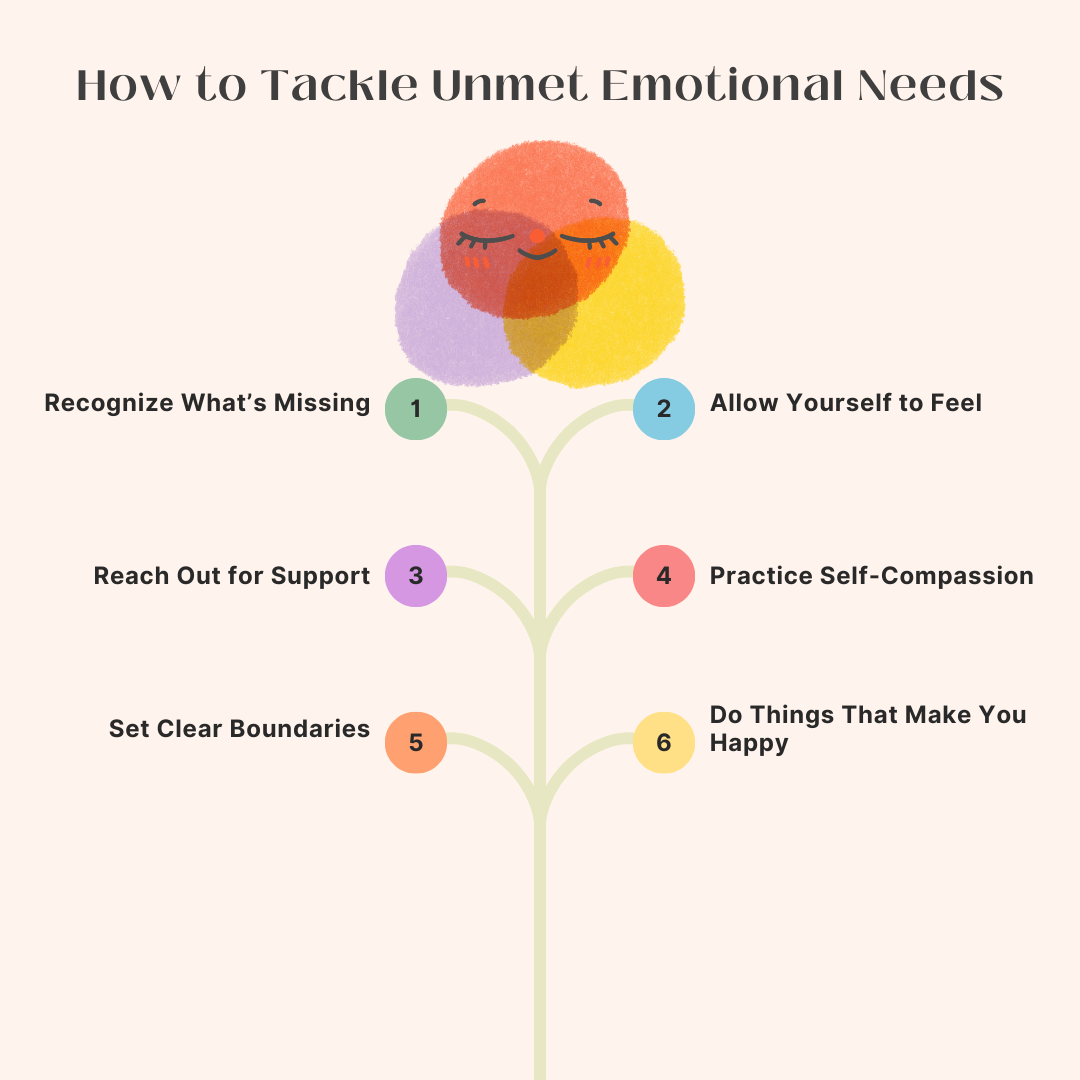Ever had that empty feeling in your gut that won’t go away? Or maybe you’re going through the motions, but nothing feels quite right. Your emotional needs might be trying to send you a message.
Think of emotional needs like your phone’s battery – they need regular charging to keep you running smoothly. When these needs run low, your whole system starts sending out alerts.
The tricky part? Most people brush these signs aside. They keep pushing forward, hoping the feelings will pass. But understanding these signals can be your first step toward feeling better.
So, take a look at these signs that show how emotional needs want attention. Some might surprise you, while others might make you nod and say, “That’s exactly how I feel!”
Understanding Unmet Emotional Needs
Unmet emotional needs are those deep feelings that go unnoticed or unfulfilled. It’s that empty feeling when no one checks in on you after a tough day or the loneliness that creeps in when you crave connection but find none.
Everyone needs to feel loved, safe, and valued. But when these needs aren’t met, life starts to feel a little heavier.
Here’s the thing: these needs show up in sneaky ways. Maybe you’re the friend who gives and gives but never asks for help. Or perhaps you’re the person who stays busy 24/7 because sitting with your thoughts feels too heavy.
The good news? Spotting these patterns is the first step to filling your emotional tank. It’s like finding the right key to a lock you didn’t know was there.
Common Signs of Unmet Emotional Needs

When our hearts feel empty, our bodies often tell us through clear signals. These warning signs show up in our daily lives and relationships.
Here are 5 different situations where it can happen:
When Basic Needs Aren’t Met
You hit snooze five times but still can’t drag yourself out of bed. The body has its own way of sending messages. When needs go unmet, these signals get louder each day.
1. You feel tired even after sleeping eight hours.
2. Food doesn’t bring you joy like it used to.
3. You skip meals without noticing.
4. Your home feels messy, but you can’t find the energy to clean it.
5. Simple daily tasks feel too hard to handle.
6. You forget to drink water throughout the day.
7. Your clothes feel uncomfortable on your skin.
8. You stay in bed long after waking up.
9. Getting dressed feels like a big task.
10. You eat at odd hours without a regular pattern.
11. Your sleep schedule keeps changing each week.
When Safety Feels Out of Reach
The footsteps behind you make your heart race, even in broad daylight. Safety needs to shape how people move through their world. Small changes in routine can signal bigger concerns.
12. You check your locks multiple times before bed.
13. Small sounds make you jump.
14. You avoid trying new things.
15. Meeting new people makes your heart race.
16. You feel uneasy in open spaces.
17. You need to sit with your back to the wall.
18. Changes in plans make you feel panicky.
19. You have a hard time trusting others.
20. You often feel like something bad might happen.
21. You keep extra supplies “just in case.”
22. You find it hard to relax in new places.
When Your Heart Feels Unheard
Those late-night texts to friends sit in drafts because you don’t want to “bother” anyone. Because emotions need space to breathe, but sometimes they get trapped inside. Here’s how they try to break free.
23. You stop sharing your thoughts mid-sentence.
24. You feel lonely in a room full of people.
25. You smile and nod even when you disagree.
26. Your feelings get stuck in your throat.
27. You apologize for things that aren’t your fault.
28. You feel invisible in group settings.
29. You hold back tears until you’re alone.
30. You give up trying to explain yourself.
31. You feel misunderstood most of the time.
32. You doubt if anyone really knows you.
33. You keep your problems to yourself.
When You Don’t Feel Valued
That promotion you wanted? You didn’t even apply because “they’d pick someone better anyway.” Self-worth needs regular care, but sometimes it falls through the cracks. Small doubts grow into big barriers.
34. You work extra hard to prove your worth.
35. You say yes when you want to say no.
36. You compare yourself to others often.
37. You downplay your achievements.
38. You feel the need to explain your choices.
39. You put others’ needs before your own.
40. You feel guilty taking time for yourself.
41. You doubt your decisions.
42. You accept less than you deserve.
43. You feel like you’re never good enough.
44. You hide your true interests from others.
When You Lose Your Sense of Purpose
Monday mornings feel like a broken record playing the same tired tune. Your bucket list has cobwebs, and your passion projects collect dust in the corner. Meaning makes life worth living. When purpose feels missing, these signals pop up.
45. You wonder why you’re doing what you do.
46. Your goals feel empty or meaningless.
47. You can’t picture your future clearly.
48. You feel stuck in a loop each day.
49. Your passions don’t excite you anymore.
50. You question your life choices often.
51. You feel like you’re just going through the motions.
52. You struggle to get out of bed in the morning.
53. You can’t remember what makes you happy.
54. You feel disconnected from your old dreams.
55. You find it hard to make plans for tomorrow.

Conclusion
Remember the signs we just talked about? From sleepless nights to avoiding friends, they are all trying to tell you something. These signals matter because they point to areas in your life that need extra care and attention.
But here’s what makes all the difference: you’re already taking steps by reading this. That shows you care about your well-being. Small changes lead to big shifts.
Take these signs as gentle nudges, not harsh alarms. Some days will be harder than others, and that’s okay. Start with one area that speaks to you the most.
Your emotional needs deserve attention, just like any other part of your health. Take it one day at a time, and remember – noticing these signs isn’t a setback. It’s the first step toward feeling more like yourself.
Frequently Asked Questions
What is a Common Way We Respond to Unmet Needs?
A common way to respond to unmet needs is by withdrawing, becoming irritable, or seeking comfort elsewhere.
What Happens When Your Needs are Not Met in a Relationship?
Not meeting emotional needs in a relationship can lead to resentment, disconnection, and frequent misunderstandings.
How Do I Tell My Partner My Emotional Needs are Not Being Met?
Tell your partner your emotional needs aren’t being met, calmly express how you feel, explain what you need, and ask for their support without blaming them.








